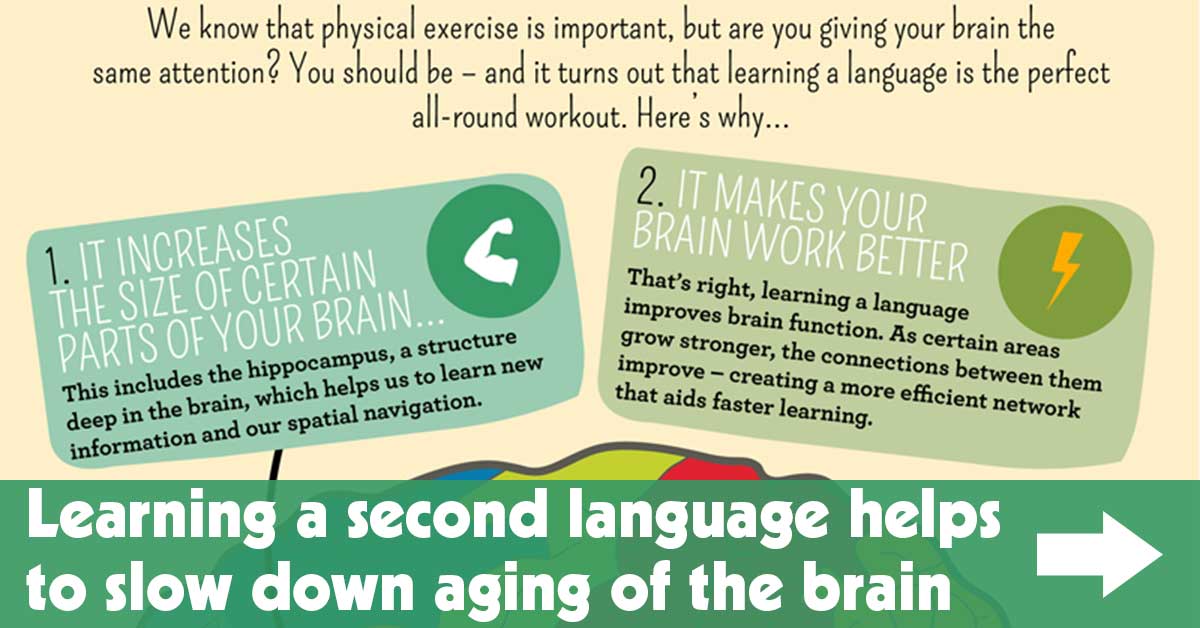
Learning a Second Language Helps to Slow Down Aging of the Brain
Scientists have identified that the training course of age-associated brain adjustments can be delayed and mitigated with bilingualism. The brain begins carrying out worse as we grow older: in general processing speed of information and facts slows down, deterioration of shorter-expression memory, as nicely as episodic memory, is professional, and regulate in excess of language techniques, visuospatial and government features is lessened. This is a process regarded as ‘cognitive aging’, which manifests by itself through anatomical adjustments at the neuronal amount in the white and grey matter in specified mind areas.
The speed at which growing old can take location can however fluctuate and is dependent upon an individual’s cognitive reserve, which is the capability of the mind to offer with the age-linked mind damage’s outcomes and maintain optimum functionality. This reserve accumulates all through an individual’s existence, as neural networks are strengthened by the brain in reaction to a wide variety of external stimuli.
The additional elaborate an individual’s neural networks are, the larger the cognitive reserve of an person is and the milder any improvements similar to age will be. It can be by now established that cognitive reserve is afflicted by socio-economic position, amount of training, leisure routines, physical exercise, career, nutrition, and various other components.
The researchers determined to acquire a glance at how bilingualism impacted brain functioning in older persons and its relation to other cognitive reserve areas. An experiment with 63 people today 60 years or more mature was executed. The individuals have been healthful and without the need of any background of neurodegenerative or psychiatric issues. The specifications to participate in the study were a partial awareness of a 2nd language at a bare minimum (‘bilingualism’ in this case this means the functionality to speak 2 languages, regardless of how fluently).
A questionnaire was taken in advance of the review started off by all of the people today that evaluated their cognitive reserve (which bundled queries concerning sports activities things to do, social relationships, job, amount of education and learning, marital status, and so on.) How extensive the people today experienced known a 2nd language also experienced to be specified, where and how typically they made use of this language, and how fluent they had been in it.
The men and women ended up provided a ‘flanker task’, a ordinarily made use of inhibitory govt command measurement. The people today have been shown a row of 5 arrows, with the central ‘target’ arrow staying the key stimulus. The “flanking” arrows on both aspect of the central arrow can issue congruently in the similar direction as the principal stimulus, incongruently in the reverse route, or they can be swapped out for other objects like squares. The individuals were being required to stage out the central target’s route, and to do so in the shortest possible time.
It truly is usually much more tricky for an particular person to concentrate and give the correct respond to in an incongruent condition. Bilingualism however exhibited a facilitatory outcome on the activity. The extended individuals experienced been finding out a 2nd language and the larger their fluency was, the much better their functionality was in the experiment.
The amount of language abilities of the folks performed a far more crucial function than how extensive they experienced been researching a 2nd language. This consequence could be stated by the reality that bilingual speakers are regularly experiencing related conflicts in each day existence, in which alternatives have to be produced and switching amongst 2 linguistic programs.

Impression Source – english
Want to use our images on your website? Proper click on on image for embed code
